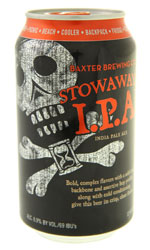
One particular entity capitalizing on the newfound demand for craft beer in Massachusetts is wholesaler Massachusetts Beverage Alliance (MBA), which launched in September of 2011. The statewide network consists of five wholesale partners — Atlas Distributing Inc., Burke Distributing, Colonial Wholesale Beverage, Commercial Distributing Company and Merrimack Valley Distributing Company.
At just over a year old, MBA currently boasts a portfolio of 12 craft brands, most notably Boulevard and Baxter Brewing. That list is about to grow. The company added Thomas Hooker Brewing Company last week and startup Newburyport Brewing Company will join the portfolio at the beginning of 2013. MBA will also soon become the master importer for the Montreal, Quebec-based Brasseurs Sans Gluten, maker of 100 percent, gluten free craft beers at the beginning of 2013.
Brewbound.com caught up with Brian Murphy, MBA’s director of sales and marketing, to discuss the company’s growing portfolio of brands, its strategy when analyzing and selecting new craft partners, and the overall state of craft beer in Massachusetts. He said the company has an evaluation chart that helps guide the decision-making process but admits they look to target top-50 brands and strong local players first.
“We want a nice mix of major national craft players and strong New England brands with a hook or a buzz that we can use to craft a marketing strategy as we launch the brand into the marketplace,” he said.
But adding new brands to the mix is always a bit of an experiment. Murphy said that he analyzes four key factors before saying ‘yes’ to any new craft brand.
“I look for quality liquid, solid financials, strong branding and a passion for the brand,” he said. “If they don’t have the passion or the quality, the brand won’t make it long term — there are too many other good beers out there.”
Of the eight or so brands Murphy hopes to add in 2013, at least one, he hopes, will be a top-50 craft brewer. He said he’s already had some serious discussions with a few.
MBA is still a bit of an experiment. It’s the brainchild of Merrimack president Richard Tatelman and Burke founder Bill Burke, who, wanted to create a network of existing Massachusetts wholesalers that would be equally invested in a company dedicated to serving the distribution needs of craft brewers. That’s why MBA is a registered LLC and holds its own distributor and importer licenses.
So is the experiment working?
“Overall it has been working well,” Murphy said. “At the end of the day we have a seat at the table with these craft brewers and that is all you can ask for. I think next year will be a pretty important year for us.”
Murphy said the company has moved over 61,000 case equivalents already this year and should approach 100,000 cases shipped by the end of 2012.

The excitement surrounding craft beer in Massachusetts should have Murphy feeling fairly confident. According to figures from the Beer Distributors of Massachusetts — a trade association representing 16 beer wholesalers in the state – craft beer shipments into Massachusetts are up 11 percent on the year. What’s more impressive is that those shipments represent nearly 15 percent of overall beer shipments into the state through the first 7 months of the year.
So what brands are performing well for MBA? Murphy said Boulevard and Baxter share the top two spots while brands like Notch Brewing, Slumbrew and import Innis & Gunn round out the top five.
And how about trends in Boston, a so-called ‘best beer city?’ Murphy said that IPA’s are still the hottest style in the market, but that saisons are becoming a popular style amongst craft-savvy drinkers.
“I think saisons can fit a broad range of palates,” he said. “It’s an underdeveloped style but I am seeing brewers do a lot of unique things in that category.”
